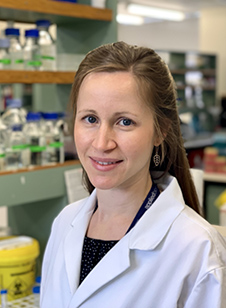Wednesday 30 October 2019 9:50am
One is something that has ensured we survive, the other is something we fear could kill us. Yet University of Otago researcher Dr Erin Macaulay is combining the two into compelling research.
Her epigenetics research examines both the placenta and cancer growth in an attempt to find commonalities between the two. It is the sort of work that has contributed to her becoming one of this year’s University of Otago Early Career Award for Distinction in Research winners.

Dr Erin Macaulay.
Originally from Boston, USA, Dr Macaulay completed her PhD in genetics at the University of Otago in 2011. Since 2013 she has been working as a research fellow at the University’s Dunedin-based Pathology Department, and in August she was appointed as a lecturer in the same department.
She calls the chance to get up each day to research and teach for a living “a dream job”.
“I can’t believe this job allows me, and pays me, to explore my natural curiosities all day long. I work in a wonderful department, surrounded by kind, supportive and encouraging people. I couldn’t imagine a better place to spend my days!”
Epigenetics focuses on heritable chemical modifications to the genome that effectively “turn-on” or “turn-off” genes without changing the gene sequence itself, Dr Macaulay explains.
“I work with these control mechanisms as they relate to early human development and to cancer. Not many people know this, but the placenta is an absolutely amazing tissue – we only need it for nine months but our whole life depends on it. And it holds some informative clues about later-life disease.”
The placenta relies on the expression of a unique set of genes for its development – genes that no other healthy human tissue expresses. Dr Macaulay has investigated these unique placental genes and discovered some are actually derived from pieces of viral DNA that integrated into our genome.
“Not only does the placenta sustain early life during pregnancy, but the way the placenta grows is actually giving us clues about cancer growth.”
During early pregnancy the placenta grows like a tumour, invading into the uterine wall to establish a nourishing blood supply for the baby, Dr Macaulay says.
“And it controls the local maternal immune response to prevent rejection of the fetus. But the placenta knows when to stop invading, in contrast to a malignant tumour.”
Her current Marsden-funded research is applying this model to cancer, while also seeking new genes that may be applicable to cancer growth.
“I love searching for clues about disease in a healthy tissue that many people just cast aside. Of course we all want to cure cancer, but realistically I do hope my research can contribute a meaningful piece to the cancer puzzle.”
Dr Macaulay says she felt “pure gratitude” when named an Early Career Award winner this year.
“I can’t wait to pay it forward. I feel now it’s my turn to help other young scientists navigate the early stages of a research career, and I really look forward to doing that.”
